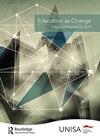A South African Perspective on Learning in Social Movement Activism
IF 1
4区 教育学
Q3 EDUCATION & EDUCATIONAL RESEARCH
引用次数: 0
Abstract
There is a body of education scholarship in South Africa that captures the role played by social movements in democratising education in post-apartheid South Africa. However, this scholarship says little about how power dynamics affect learning and intellectual labour in social movements or social movement organisations. In addition, the issue of learning in social movements or social movement organisations is hardly explored in the South African social movement literature. This lack of focus on how activists, especially grassroots activists in working-class communities, learn and produce knowledge in social movements and organisations obscures the complexity of learning and knowledge production in activist settings. This article explores how activists, especially grassroots activists, learn in social movements. Based on secondary literature and interviews, the article advances two main arguments: First, learning in social movements and organisations takes place in non-formal and informal ways. Both these forms of learning take place inside and outside formal educational settings. And they both contribute to the empowerment and critical consciousness of activists in social movements and organisations. In addition, informal learning takes place inside and outside popular educational spaces. However, it is not inevitable that non-formal and informal forms of learning in activist settings will generate critical knowledge and activist practices that disrupt the status quo. Second, power relations based on “race”, social class, gender, and sexuality, among other axes of social division, impact on how learning takes place in non-formal or popular contexts of education. This article seeks to understand how power relations shape the learning and knowledge production process in social movements and organisations.南非社会运动激进主义学习观
南非有一个教育学术机构,捕捉到社会运动在种族隔离后的南非教育民主化中所发挥的作用。然而,这项研究很少涉及权力动态如何影响社会运动或社会运动组织中的学习和智力劳动。此外,南非社会运动文献中几乎没有探讨社会运动或社会运动组织中的学习问题。缺乏对活动家,特别是工人阶级社区的基层活动家如何在社会运动和组织中学习和生产知识的关注,掩盖了活动家环境中学习和知识生产的复杂性。这篇文章探讨了活动家,尤其是草根活动家,如何在社会运动中学习。基于二次文献和访谈,本文提出了两个主要论点:第一,社会运动和组织中的学习以非正式和非正式的方式进行。这两种学习形式都发生在正规教育环境内外。它们都有助于增强社会运动和组织中活动家的力量和批判性意识。此外,非正式学习在受欢迎的教育空间内外进行。然而,在积极分子的环境中,非正规和非正式的学习形式会产生破坏现状的批判性知识和积极分子的做法,这并非不可避免。其次,基于“种族”、社会阶级、性别和性取向的权力关系,以及社会分裂的其他轴心,影响了学习在非正规或大众教育背景下的进行方式。本文试图了解权力关系如何影响社会运动和组织中的学习和知识生产过程。
本文章由计算机程序翻译,如有差异,请以英文原文为准。
求助全文
约1分钟内获得全文
求助全文
来源期刊

Education As Change
EDUCATION & EDUCATIONAL RESEARCH-
CiteScore
1.40
自引率
0.00%
发文量
29
审稿时长
24 weeks
期刊介绍:
Education as Change is an accredited, peer reviewed scholarly online journal that publishes original articles reflecting critically on issues of equality in education and on the ways in which educational practices contribute to transformation in non-formal, formal and informal contexts. Critique, mainly understood in the tradition of critical pedagogies, is a constructive process which contributes towards a better world. Contributions from and about marginalised communities and from different knowledge traditions are encouraged. The articles could draw on any rigorous research methodology, as well as transdisciplinary approaches. Research of a very specialised or technical nature should be framed within relevant discourses. While specialised kinds of research are encouraged, authors are expected to write for a broader audience of educational researchers and practitioners without losing conceptual and theoretical depth and rigour. All sectors of education are covered in the journal. These include primary, secondary and tertiary education, adult education, worker education, educational policy and teacher education.
 求助内容:
求助内容: 应助结果提醒方式:
应助结果提醒方式:


